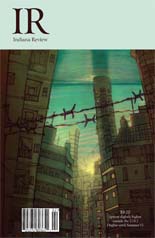Interview: Indiana Review
The Penguin Aesthetic
by Jacqueline Vogtman
An Interview with Alessandra Simmons, Outgoing Editor of Indiana Review
 Alessandra Simmons, originally from Los Angeles, is an MFA candidate at Indiana University where she is the outgoing Editor of Indiana Review. She has poems forthcoming in WomenArts Quarterly Journal and has been nominated for AWP Intro Awards in both poetry and nonfiction.
Alessandra Simmons, originally from Los Angeles, is an MFA candidate at Indiana University where she is the outgoing Editor of Indiana Review. She has poems forthcoming in WomenArts Quarterly Journal and has been nominated for AWP Intro Awards in both poetry and nonfiction.
Jacqueline Vogtman: First of all, thanks for agreeing to do this interview. I noticed while reading Indiana Review‘s blog [Under the Blue Light] that you’ll be stepping down as Editor soon. How soon? Also, I was wondering if you could discuss how long you’ve been Editor there, what the experience has been like, and what your feelings are as you prepare to leave the position.
Alessandra Simmons: I’ll be stepping down in May. [Interviewer’s note: this interview was conducted at the end of April, 2011]. I’ve been working with IR since 2008 when I first arrived as an MFA student at IU—but my role has changed each year. First I was an associate poetry editor, then the associate editor, and this year worked as editor. It has been eye-opening and rewarding to see the journal from so many vantage points. Especially in the year I have been editor, I’ve learned so much about the inner workings of IR—from the more administrative tasks of managing subscriptions and distribution to the editorial work of selecting poetry, fiction, and nonfiction that we think will be a good fit for IR. I’m sad to be stepping down and leaving such a wonderful literary circle but I’m also excited to be handing the reigns over to fiction writer Deborah Kim because I know IR will continue publish exciting new work.
JV: On a related note, I thoroughly enjoyed the Baudelaire poem (“Be Drunk”) that you included in that same blog post—it’s always been one of my favorites. That made me wonder: in a position that requires one to immerse oneself in what’s new in contemporary literature and offer up fresh voices to readers, what place do classic literature and classic authors (like Baudelaire, et al) play in your reading life?
AS: As a reader and writer of poetry, I think it’s important to important and necessary to read both contemporary and classic literature. Contemporary authors are more often than not in some kind of dialogue with classic authors so it’s helpful to keep the classics fresh in my mind.
JV: Staying with the blog for a moment, when did Indiana Review start this blog, and what was the impetus behind it? Do you think it has attracted more readers or has had any affect on your readership?
AS: To my knowledge the blog was started in 2007 to help open up communications with our readers and the writers who submit work to us. Since then we’ve used it to announce IR happenings, such as contests, the opening and closing of submissions, to share news about contributors’ or public readings and also general thoughts on the current literary world. It’s hard to say how the blog has directly affected our readership; we can see how many people read our blog, but not all the viewers correlate to subscribers.
JV: Getting back to your editorship, what is the impression of the work you’ve been receiving since you’ve been Editor? Have you seen any trends, or anything that’s changed in fiction, poetry, or nonfiction over the past few years?
AS: Yes, it’s funny the trends you start to notice when reading large amounts of work. Bees, they are just everywhere! It seems that poets are concerned with keeping bees alive on the page as news about the decline of the bee population is made known. Apples, clowns, space travel, these are a few other thematic trends I’ve seen in my three years on staff. On a larger scale, a trend I’ve seen is the move of narrators/speakers in fiction and poetry to be more and more self-aware or self-referential.
JV: You are a graduate student at Indiana, and the staff of the journal is made up of grad students. How do you think that informs the work you accept and your manner of acceptances/rejections? I ask because as a former assistant editor at Mid-American Review, I always felt a pang of empathy voting “no” against certain stories, especially those that showed promise but weren’t quite there yet, and it struck me as ironic that I was in the position to reject other people’s precious work when my own work was also out there getting rejected.
AS: All of us on staff at IR are students, which I think makes us generous readers. We want stories, essays and poems to succeed. Often when I vote no for a piece, I don’t only think about the journal, but also in terms of the piece itself—perhaps if the work isn’t quite there yet, it would actually be doing it a disservice by publishing it in its current state. I’ve seen a story we really wanted, but ultimately rejected because the ending wasn’t strong enough, published later in another journal with a new and better ending—so for that story, saying no was really in the best interest of the author and his story.
JV: But also, do you think because you’re staffed primarily by grad students, you include fresher work than journals staffed primarily by editors who’ve been in academia or publishing for a long time?
AS: As writing students, I think we do have a keen eye for work that challenges our notions of a specific genre can do. I think our next issue has some great essays that challenge the definition of what a personal essay is meant to accomplish.
JV: On a related note, how do you balance your work as a grad student, your writing, and your editing duties at Indiana Review?
AS: Balance—isn’t that what everyone is after. It’s hard! I’ve tried to prioritize my writing by setting aside time when I force myself not to check IR’s email or worry about IR related topics. One of the goals I had as I came into the editorship was to launch a new website for IR. (I think our website is using the same template it has been using since the invention of the Internet.) However, with all the regular demands of the editorship, being a student, and writing, work on the new website has been slow. But I have high hopes for the website to be completed during Deborah’s year as editor. I’ve learned I’ve just had to let some things slide.
JV: This is a rather general question, but one that needs to be asked: do you see Indiana Review as promoting any particular aesthetic, or do you simply publish the best work you read regardless of aesthetic?
AS: At editor’s meetings we often talk about how IR does have a certain aesthetic that is quite difficult to explain, but that you get to know as you read the magazine. High quality, well written prose or verse is a key ingredient, but I think there is something more–work that reaches beyond itself, work that is a little bit quirky. At the end of each school year we get t-shirts for the IR staff. A couple years ago, the t-shirt pictured a group of penguins wearing an assortment of hats and t-shirts with the blurb: “This is our aesthetic.” I think the drawing captures our aesthetic better than I could ever put it into words.
JV: On a related note, how much of what you publish comes from the slush pile, and do you have any advice for submitters?
AS: Most of the work we publish comes from the slush pile, but I’m not sure of what exact percentage. Advice for submitters…keep your cover letters simple and to the point, and let your writing speak for itself. Also, when you get a response from us on your submission, wait a couple of months before you re-submit, but do, do re-submit. Also, our Prizes are a great way to get a discounted subscription and your submissions read quickly because all prize submissions are considered for publication, not just the winner of the $1000 prize.
JV: Speaking of submissions, Indiana Review is one of the many, many lit mags that now use an online submission manager. Has this changed the amount of submissions you receive, and do you still allow mailed submissions? If so, what do you think the ratio is between people who submit online and people who submit through mail, and is there any advantage one way or the other?
AS: We’ve seen a trend shifting toward the online submission manager, but we still allow mailed submissions for people who do not have access or prefer not to use the internet. We try not to prefer one kind of submission to the other—we work hard to keep both groups of submissions read at about the same pace.
JV: Now, for a compliment: Indiana Review is one of the best and most long-standing literary magazines out there. What other lit mags do you guys tend to respect and compare yourselves to?
AS: Thank you! We are thankful for the years of support and growth. When Indiana Review first started in 1976 it was called Indiana Writes and was quite local and quirky–its fun to look through our library of past issues and see how the magazine has evolved into what it is today. We are lucky to have exchange relationships with many journals that are out there. IR has a lot of respect for all the journals that are working hard to showcase new writing, especially Hayden’s Ferry Review, Black Warrior Review, and Gulf Coast, which are all student run as well.
JV: For the final question, I’m wondering if you’d discuss what you see for the future of Indiana Review—are there any changes coming up? For instance, I was curious: Does IR ever have plans to include an online component (besides the blog), where you’ll put a selection of the print issues online?
AS: At this time, we don’t put up selections online and we don’t have plans to in the near future, although we would like to increase the amount of bluecasts we have on our blog. We’ve had a lot of good time recording authors read their work, but we are still working on the technology of housing the podcast in archives that are user-friendly.
JV: Once again, thank you so much, Alessandra, for your thoughtful answers!
AS: Thank you too! It’s been great to reflect on IR with the help of your questions.
Jacqueline Vogtman’s fiction has appeared or is forthcoming in Avery Anthology, Berkeley Fiction Review, Copper Nickel, Drunken Boat, and Versal, among other journals. She received her MFA from Bowling Green State University, where she served as an assistant editor of Mid-American Review.

